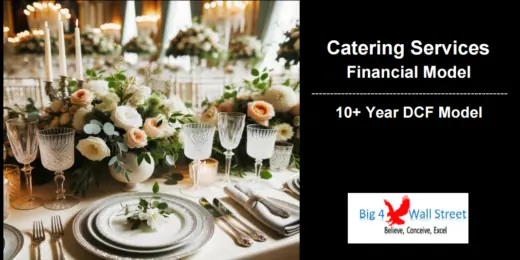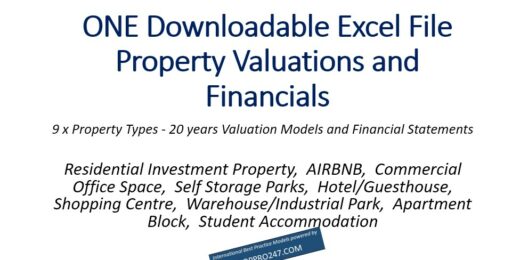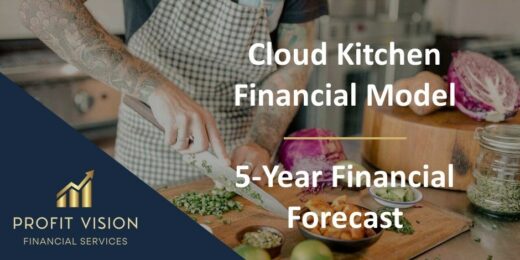Catering
Financial model templates emerge as invaluable allies in this journey, providing a structured framework to illuminate the path to profitability. These templates offer a detailed roadmap for forecasting revenues, managing costs, and identifying investment needs. They allow catering startups to simulate various scenarios, from intimate dinner parties to large-scale events, enabling a deep dive into the financial feasibility of diverse culinary ventures. By demystifying financial planning, these models empower entrepreneurs to make informed decisions, optimize operations, and ultimately carve a niche in the bustling world of catering services.
Food Bar Financial Model 5 year 3 Statement
A comprehensive editable, MS Excel spreadsheet for tracking Food Bar…
Restaurant Finance Model 5 Year 3 Statement
A comprehensive editable, MS Excel spreadsheet for tracking Restaurant finances,…
Catering and Ballroom Rental Financial Model
This Excel model is a highly adaptable and user-friendly tool…
Catering Services Business Financial Model (10+ Yrs DCF and Valuation)
The catering services business financial model is a comprehensive tool…
Beverage Trailer (Self-Pour or Manual) 10-year Financial Model
This beverage trailer financial model will provide you with 10…
Food and Beverage (Restaurants, cafes, food trucks, and beverage outlets ) Financial Model Template
Elevate your food and beverage (Restaurants, cafes, food trucks, and…
Bundle – Business Financial Forecasting Models
The purpose of this Bundle of Business Forecasting and Financial…
Discounted Big Bundle Real Estate Valuation and Financial Models
One Excel file for this bundle of Valuation and Financial…
Cloud Kitchen Financial Model – 5 Year Financial Forecast
Financial Model presenting a business scenario for a Cloud/Ghost Kitchen.
Gourmet Food Store Financial Model Excel Template
Gourmet Food Store Financial Model Allows you to start planning…
Light-Meal Food Bar Financial Model-5-year DCF Valuation
This model provides a full 5-year financial model for a…
Hotel/Guesthouse/Resort Development Model and Valuation – 20 year Three Statement Analysis
This Hotel / Holiday Resort Development Model will take you…
Catering and or Catering Equipment for HIRE 10 – year Business Model
This Catering and or Catering Equipment for HIRE Business and…
Bistro Financial Model Excel Template
Check Our Bistro Financial Model. Requesting a loan without a…
Banquet Hall Financial Model Excel Template
Buy Banquet Hall Financial Model. Excel template - robust and…
Coffee/Tea Lounge – 3 Statement Financial Model with 5 years Monthly Projection and Valuation
This Coffee/Tea Lounge FM is a perfect tool for financial…
Juice Bar- 3 Statement Financial Model with 5 years Monthly Projection and Valuation
This Juice bar FM is a perfect tool for financial…
Multi Cuisine Cafe – 3 Statement Financial Model with 5 years Monthly Projection & Valuation
This Multi-Cuisine Café business Plan Model is a perfect tool…
Restaurant Key Performance Indicator Tracker (Sales, Average Customer, Top 10 Menu & Worst 10 Menu, etc.)
This financial report explained the trend in quantity sold, sales…
Restaurant Startup/Existing Business Financial Projection 3 Statement Excel Model
Highly versatile and user-friendly Excel model for the preparation of…
Catering Financial Model Excel Template
Check Our Catering Pro-forma Template. Excel template - robust and…
Step-By-Step Guide to Opening Your Catering Business

Starting a catering business can be an incredibly rewarding endeavor, blending the art of gastronomy with the thrill of entrepreneurship. This unique venture not only taps into the vast potential of the food industry—a sector known for its resilience and growth—but also offers the personal satisfaction of delighting clients with culinary masterpieces. However, launching a catering service is not without its challenges. Aspiring caterers must navigate the complexities of business planning, health regulations, and client acquisition, all while maintaining a consistent quality of service. The balance between creativity in the kitchen and savvy business practices is crucial, making this journey both exciting and demanding.
This article provides a comprehensive guide on how to start a catering business. At its core, successful catering ventures are built on solid business foundations, and one of the critical tools to achieving this is through effective financial modeling. Financial modeling not only assists in securing initial funding by presenting a clear vision of the venture’s profitability and growth prospects but also plays a pivotal role in the day-to-day management of the business. It helps caterers forecast revenues, manage costs, and navigate the financial intricacies of the food industry. By combining practical steps for setting up your start-up catering business with advanced strategies like financial modeling, this guide aims to equip aspiring caterers with the knowledge and tools needed to turn their culinary passions into a profitable and sustainable business.
An Overview of a Start-Up Catering Business
A start-up catering business is a newly established venture that provides food and beverage services for various events and functions. Catering is integral to numerous events such as weddings, corporate meetings, birthday parties, and other social gatherings, where providing food plays a central role in the event's success and the guests' enjoyment.
A start-up catering business can offer multiple catering styles, including buffet and plated catering. Buffet catering allows guests to serve themselves from various dishes set out on tables, promoting a more casual and interactive dining experience. In contrast, plated catering involves serving individual meal portions to guests at their tables, offering a more formal and controlled dining environment.
Catering Service List
The catering services list for a start-up catering business typically includes:
- Menu Planning: It involves creating a tailored food and drink menu that suits the event's theme, the client's preferences, and dietary restrictions. It's a critical step that ensures a variety of appealing and appropriate options for guests.
- Event Coordination: Caterers work closely with clients and event planners to ensure that the food and beverage services are seamlessly integrated into the overall event plan, including timing, logistics, and specific client needs.
- Food Preparation: This encompasses all the activities related to preparing the food for the event, from sourcing ingredients to cooking. It requires adherence to high standards of food safety and quality.
- Food Transport: Caterers must ensure that food is transported safely and efficiently from the preparation site to the event location, maintaining the appropriate temperature and quality.
- Event Setup: This service includes setting up the dining area, including tables, chairs, tableware, and decorations, according to the event's theme and requirements.
- Guest Services: During the event, catering staff serve guests, manage the buffet or plated meals, and attend to guests' dietary needs or requests, ensuring a pleasant dining experience.
- Clean-Up Services: After the event, caterers are responsible for cleaning the dining area, disposing of waste, and ensuring the venue is returned to its original state. This service is crucial for the client's convenience and the venue's integrity.
Each item on the catering services list is essential for delivering a successful catering experience that meets the client's needs and exceeds guests' expectations, making it critical to a start-up catering business's offerings.

How to Start a Catering Business
How to start a catering business offers an exciting opportunity to blend culinary passion with entrepreneurial ambition, serving memorable experiences for various events. With meticulous financial planning, dedication, and a flair for food and service, launching a catering business can be a fulfilling path to professional independence and creative expression.
Step 1 - Choose Your Business Model
The first step is to decide the type of catering service business you want to start, which will influence every other decision you make. Several models are to consider, including special event catering (weddings, corporate events), mobile catering (food trucks, pop-ups), or niche catering focusing on specific cuisines or dietary needs. Your choice should align with your culinary strengths, budget, catering services list, and the market demand in your area. This decision will set your business's foundation, helping you target the right customers and differentiate yourself in the market.
Step 2 - Develop a Winning Business Plan
Once you've decided on your catering service business model, the next step is to craft a winning business plan. This document should outline your business objectives, market analysis, marketing and sales strategies, financial projections, and operational plan. A well-thought-out business plan serves as a roadmap for your business, guiding you through the startup phase to growth. It is also crucial for securing funding, as it demonstrates to investors or lenders the viability and potential profitability of your catering business.
Step 3 - Get Your Catering Service Business Funded
With your business plan, securing the necessary funding to launch your catering service business takes time. Several funding options are available: bank loans, crowdfunding, investor funding, or small business loans. The right choice depends on your financial situation, business needs, and the control you wish to retain over your business. It's important to thoroughly research and consider the terms and conditions of each funding option to ensure it aligns with your business goals.
Step 4 - Regulate Your Catering Service Business
Before starting to operate, you must ensure your business fully complies with local, state, and federal regulations. This involves obtaining necessary permits and licenses, such as a food service license, health department permits, and a business license. Additionally, you'll need to adhere to food safety regulations to ensure the health and safety of your customers. Compliance protects you from legal issues and builds trust with your clients.
Step 5 - Set Your Pricing Strategy
Pricing is a critical aspect of your catering business that can significantly affect its success. Your pricing strategy should reflect the quality of your services, cover costs, and ensure profitability. Consider factors like food costs, labor, overheads, and the competitive landscape when setting your prices. It's also important to offer various pricing options to cater to different budgets, which can help you attract a broader client base.
Step 6 - Team Up with Great Talents
The success of your catering business heavily relies on the team you build. Each team member, from chefs and servers to event coordinators, is crucial in delivering high-quality services to your clients. Look for individuals with the necessary skills and experience to share your vision and passion for the business. Training and team building can also enhance your team's performance and customer service, setting your business apart from competitors.
Step 7 - Unveil Your Catering Service Business Brand
Creating a solid brand for your catering service is crucial for standing out in a crowded market. Your brand encompasses your company's identity, values, and the promise you make to your clients. It's more than just a logo or a color scheme; it's the overall experience customers can expect when they choose your catering service. Your online presence is particularly important. Create a professional website that showcases your menu, past events, testimonials, and high-quality photographs of your food and events. Utilize social media platforms to engage with your audience, share behind-the-scenes looks, and highlight special offers or events.
Finally, let's answer "How to Start a Catering Business?" It involves careful planning and execution across these steps. By choosing a suitable business model, developing a solid business plan, securing funding, ensuring regulatory compliance, setting strategic pricing, and building a talented team, you can unveil your catering service business brand that stands out in the competitive food industry.

Unlock the Success of a Start-up Catering Business
A start-up catering business blends culinary skills with entrepreneurial insight. The first step in this endeavor involves thorough market research to understand your ideal business model. A detailed business plan is crucial; it should outline your vision, define your niche, and set clear objectives. Obtaining the necessary permits and licenses is a critical step. Additionally, setting up a clever pricing strategy can help you attract a broader audience. With great talents on your team, you can unveil a successful start-up catering business.
Financial modeling plays a pivotal role in the success and growth of a start-up catering business. It provides a comprehensive framework to forecast business performance, manage cash flow, and strategize pricing. It is instrumental in securing funding from investors or loans from banks by showcasing the business's potential for profitability and growth. Effective financial management, facilitated by robust financial modeling, is crucial in navigating the challenges of starting a catering business and steering it toward sustained success and expansion.

























